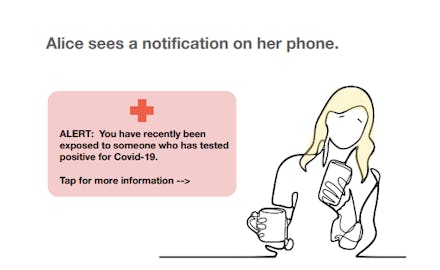Google and Apple are creating a way to alert people when they come in contact with someone who has coronavirus

Governments of the world have been prodding tech companies to help in tracking transmissions of coronavirus. Now the two companies responsible for the most popular smartphone operating systems around are heeding the call. In a blog post, Google and Apple announced that they will work together to roll out updates that will utilize Bluetooth technology to create a contact-tracing network that should help health experts better understand how COVID-19 is spread.
According to a series of white papers published regarding the project, Apple and Google plan to utilize short-range Bluetooth communications protocols in smartphones to track when people come within close proximity to one another. This system creates a network of contacts, so when one person finds they have been diagnosed with COVID-19, they can either report that information or health authorities will be able to convey it. Once one person in the network has been identified as infected, all others who came into close contact with that person will receive an alert.
The system will begin by having users opt-in to the tracking procedure — at least at first. The initial run of Apple and Google's plan will arrive in mid-May and will require individuals to download an app in order to participate in the program. While there are concerns that this method may limit adoption, it will buy health experts and organizations more time to make sure they are able to ramp up to manage the incoming information.
In the months following, the companies intend to build the tracking protocol directly into the underlying operating system, which would make it possible to trace the interactions of just about every iOS and Android phone. This feature will still require users to opt-in if they want to participate, but will not require any additional app. It will also introduce the ability to share contact-tracing information with a broader ecosystem of health apps and other services, which may want to make use of the information in other ways. In a blog post, the companies said that, "Privacy, transparency, and consent are of utmost importance in this effort, and we look forward to building this functionality in consultation with interested stakeholders." They also promised to "openly publish information about our work for others to analyze."
There are plenty of ethical questions surrounding the suggestion of phone tracking, even for the purposes of public health. Some governments have taken advantage of the health crisis to launch services that are potentially invasive to the privacy of citizens. In Iran, for instance, the government created an app that supposedly helped residents determine if they have been infected with coronavirus. Instead, according to VICE, the app seems to track location data of millions of Iranians in real-time. According to a report from The Guardian, the Israeli government has approved emergency measures that allow intelligence agencies to look at the movements of a person who has tested positive for COVID-19 and monitor the phone activities of those who are believed to be infected. The American Civil Liberties Union has already voiced its concerns about phone tracking and has insisted that user privacy still must be put first.
The system devised by Google and Apple will certainly be scrutinized by those concerned with individual privacy. The system operating on an opt-in basis is a good start. It also utilizes Bluetooth rather than GPS, so it shouldn't record a person's physical location. The companies claim that users will be kept anonymous, even if they have been infected. Instead of maintaining a single, static identifier for each phone, the system will cycle through a series of keys every 15 minutes to retain privacy. If a person is reported infected, other users who came in contact with that user's keys will be notified, but nothing will be done to out the infected person. Additionally, the companies say they won't maintain a master list of phones and keys associated with each device, so there should be no way to reveal any person's status.
The fundamentals seem to be in place to maintain user privacy while establishing a high-tech, low effort contact tracing system. Time will tell how well this plan is actually implemented, and if the companies or government attempts to get overzealous in accessing information, as they often have a tendency to do.